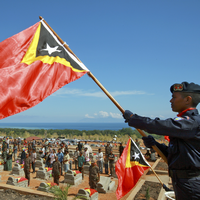A little more than 10 years after the people of what is now Timor-Leste voted for independence, this small, half-island country has compressed into a few short years what many other post-colonial states have taken decades to achieve. It has been largely destroyed, achieved independence, had a political crisis, transitioned to democracy, and now appears to be heading into a period of political calm and economic growth. After the near-catastrophic events of 2006, Timor-Leste's prospects are looking relatively positive, even if a number of important caveats apply.
After roughly 300 years of Portuguese colonial neglect came to an end in December 1975, what was then known as Portuguese Timor was invaded by neighboring Indonesia. The territory became a war zone: More than a quarter of the population was killed or died as a result of the subsequent occupation (which was never recognized under international law), and the rest was deeply traumatized.
Twenty-three years later, when Indonesia's Suharto was pushed from office in 1998, Jakarta was in the midst of a financial crisis. The cost of the occupation of Timor Leste, both financially and in terms of its continuing damage to Indonesia's international reputation, alienated the new president, B. J. Habibie, and his technocratic peers, and interfered with his attempts to oversee Indonesia's political reform. Faced with increasing calls for some sort of long-term political transition towards self-determination, Habibie unexpectedly announced that Timor-Leste could vote on whether it wished to be independent or an "autonomous" province within Indonesia.

